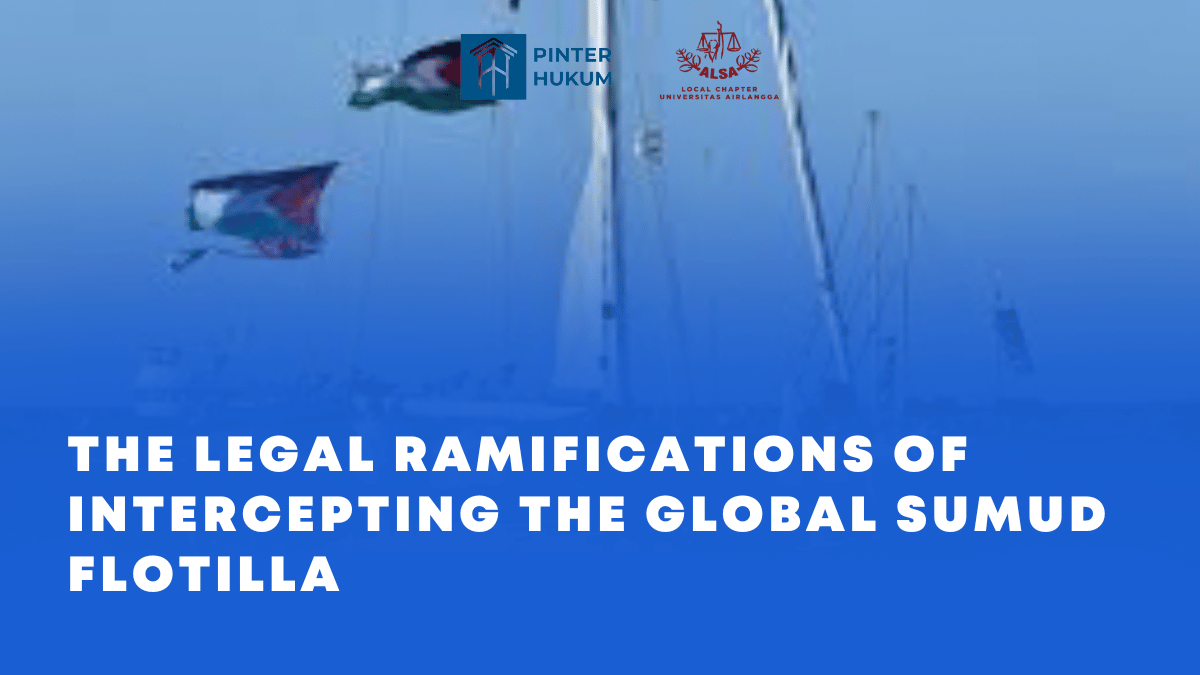In late September 2025, the Global Sumud Flotilla (GSF) — an international coalition of activists, humanitarians, and lawmakers from over forty countries — set sail toward Gaza, aiming to deliver humanitarian aid amid the ongoing blockade and humanitarian crisis. Among the passengers was Swedish activist Greta Thunberg, whose participation drew global media attention. The flotilla’s purpose was symbolic yet urgent: to deliver relief supplies and challenge the legality of Israel’s long-standing naval blockade on Gaza. But before it could reach the coast, the convoy was intercepted by Israeli naval forces about 70 nautical miles from Gaza, in international waters. Several vessels were boarded, their passengers detained, and reports of mistreatment and inhumane conditions soon followed.
The incident triggered widespread condemnation and renewed debate about the legality of Israel’s blockade and its enforcement under international law. Israel maintains that its blockade that has been imposed since 2007, is lawful and necessary to prevent arms smuggling to militant groups. Activists and humanitarian organizations argue that the blockade constitutes collective punishment and violates international humanitarian law (IHL) by depriving Gaza’s civilian population of essential goods. The alleged mistreatment of detainees ranging from physical coercion and forced kneeling to deprivation of food and water, further raises questions about Israel’s compliance with its obligations under the Geneva Conventions and international human rights law.
Baca juga: Analysis of International Aviation Law in The Crash of Air India Flight Ai171 in Ahmedabab, India
Legal Frameworks: The Law of the Sea and Armed Conflict
To evaluate the incident, three key legal frameworks are relevant: the United Nations Convention on the Law of the Sea (UNCLOS), the San Remo Manual on International Law Applicable to Armed Conflicts at Sea (1994), and the Geneva Conventions, which form the backbone of IHL.
Under UNCLOS (1982), vessels sailing in international waters enjoy freedom of navigation and are generally immune from interference by foreign states, except under limited circumstances such as piracy or unauthorized broadcasting. However, these rules apply primarily in peacetime. In armed conflict, maritime conduct is governed by the law of naval warfare, which modifies certain peacetime rights. The San Remo Manual—a widely recognized restatement of customary international law—permits the imposition and enforcement of naval blockades under specific conditions. A blockade must be declared, effective, and not primarily intended to starve civilians or deny them essentials for survival. Critically, it must also allow humanitarian relief supplies to pass under supervision if necessary for the civilian population’s survival.
Was the Blockade Lawful, and Its Enforcement Justified?
Applying these rules, the legality of Israel’s interception turns on two core questions: whether the blockade itself is lawful and whether the manner of enforcement complied with international legal standards.
If the blockade meets the San Remo criteria: proper declaration, effectiveness, and proportionality, Israel may legally enforce it by intercepting vessels attempting to breach it, even in international waters. Yet, if the blockade disproportionately harms civilians or obstructs essential aid, it violates both the San Remo Manual and the Fourth Geneva Convention, which prohibits collective punishment and the starvation of civilians as a method of warfare. Many UN officials and humanitarian experts argue that Israel’s blockade, in practice, fails to distinguish between combatants and civilians, rendering it incompatible with IHL.
The humanitarian nature of the Sumud Flotilla also bears legal significance. Under the San Remo Manual (Rules 102–104), vessels exclusively assigned to humanitarian missions must be respected and protected, provided they identify themselves, submit to inspection, and refrain from hostile acts. The flotilla’s organizers assert that their mission was peaceful and transparent, carrying food, medicine, and symbolic aid. Israel counters that the convoy’s cargo was minimal and could have been delivered through official humanitarian channels. If the flotilla indeed met the criteria for protected humanitarian missions, forcibly boarding and detaining its participants may contravene international law.
Interception in International Waters
Another contentious point is the location of the interception. The flotilla was reportedly stopped around 70 nautical miles from Gaza, clearly within international waters. Under the San Remo Manual, a blockading state may enforce its blockade beyond its territorial sea if a vessel is suspected of intending to breach it. However, the further from the blockaded area the interception occurs, the heavier the burden of proof becomes for the intercepting state to show intent and necessity. If the flotilla’s actions were demonstrably peaceful, interception at such distance could constitute an excessive assertion of force inconsistent with proportionality and the freedom of navigation under UNCLOS.
Baca juga: Tri Hita Karana: Kunci Harmoni dan Penyelesaian Konflik di Bali
Treatment of Detainees
The reported treatment of the flotilla’s passengers raises further legal implications. Allegations of degrading or inhumane treatment, such as forced displays of Israeli symbols, physical coercion, and denial of due process, would violate Israel’s obligations under both Common Article 3 of the Geneva Conventions and Article 7 of the International Covenant on Civil and Political Rights (ICCPR). These provisions impose an absolute prohibition on torture and cruel, inhuman, or degrading treatment. As many detainees are foreign nationals, questions of diplomatic protection and state responsibility may arise if violations are confirmed.
Balancing Security and Humanity
The Global Sumud Flotilla case epitomizes the enduring tension between military necessity and humanitarian obligation. Even if the blockade were lawful, its enforcement must still conform to the principles of humanity and proportionality. States enforcing blockades bear the burden of ensuring that civilians are not collectively punished and that humanitarian aid is facilitated, not obstructed. Conversely, organizers of humanitarian flotillas must ensure their missions remain neutral and transparent to retain protection under international law.
Penulis
Nadya Maritza Anandieta – ALSA Local Chapter Universitas Airlangga









